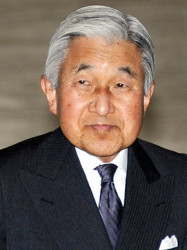TOKYO (Reuters) – Japanese Emperor Akihito marked the 70th anniversary of the end of World War Two with an expression of “deep remorse” over the conflict on Saturday, a departure from his annual script which could be seen as a subtle rebuke of Prime Minister Shinzo Abe.

Abe on Friday expressed “utmost grief”, but said future generations should not have to keep apologising for the mistakes of the past. He offered no fresh apology of his own.
“Reflecting on our past and bearing in mind the feelings of deep remorse over the last war, I earnestly hope that the ravages of war will never be repeated,” Akihito, 81, said at a memorial service on the anniversary of the day his father, Hirohito, announced Japan’s defeat.
“Together with all of our people, I now pay my heartfelt tribute to all those who lost their lives in the war, both on the battlefields and elsewhere, and pray for world peace and for the continuing development of our country.”
The legacy of the war still haunts relations with China and South Korea, which suffered under Japan’s sometimes brutal occupation and colonial rule before Tokyo’s defeat in 1945.
The soft-spoken Akihito has often urged Japan not to forget the suffering of the war and tried to promote reconciliation with Asian countries. His comments have attracted increased attention at a time when Abe appears to be pushing for a less apologetic tone towards Japan’s past.
Akihito had expressed remorse before, but not at the annual service. The constitution bans the emperor from any political role, so his remarks need to be carefully nuanced.
Yesterday, Abe sent a ritual cash offering to Yasukuni Shrine for war dead but did not visit the shrine, seen in China and South Korea as a symbol of Tokyo’s wartime militarism.




